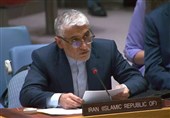US Stands Firm against Ceasefire in UN Debate on Gaza Crisis
TEHRAN (Tasnim) – In the UN Security Council debate addressing the Israel-Gaza conflict amid humanitarian crisis in Gaza, the United States remained unwavering in its resistance to calls for an immediate ceasefire, setting the stage for a pivotal international showdown.
The United Nations Security Council convened its inaugural open debate on the Israel-Gaza war, with the majority of its members advocating for an immediate ceasefire to facilitate the delivery of humanitarian aid to Palestinians enduring relentless Israeli bombardment in Gaza.
Comprising 15 members, including veto-wielding permanent members such as the United States and Russia, the council has thus far been unsuccessful in passing a resolution to halt the ongoing violence.
In a notable move, the United States, a staunch ally of Israel, exercised its veto power last week to block a resolution endorsed by 12 other council members. The resolution aimed to initiate a pause in the conflict. An earlier resolution, drafted by Russia, also met rejection.
This high-profile debate featured nearly 90 countries on the speakers' list, including approximately 30 foreign ministers and deputy ministers. Many echoed calls for an immediate ceasefire, demanding an end to attacks on Palestinian civilians amidst the widespread destruction in Gaza and the rising death toll.
Egypt's Foreign Minister Sameh Shoukry expressed regret over the council's inability to adopt a resolution or call for a ceasefire to terminate the war. Jordan's Foreign Minister Ayman Safadi, on behalf of the 22-member Arab Group at the UN, accused Israel of "razing Gaza to the ground" and lamented the Security Council's failure to demand an immediate ceasefire. Safadi urged diplomats to adopt a resolution to stop the war, condemn the killing of civilians, and prevent the starvation and collective punishment of Palestinians.
"The Security Council must take a clear stance to reassure 2 billion Arabs and Muslims that international law will be applied," Safadi emphasized.
In contrast, the United States proposed a humanitarian pause, which is considered less formal and of shorter duration than a full ceasefire. US Secretary of State Antony Blinken urged the council to support a new US-led resolution that "incorporates substantive feedback." The draft, according to the AFP news agency, would defend the "inherent right of all states" to self-defense while calling for compliance with international law. It would endorse "humanitarian pauses" to allow aid into Gaza but not a complete ceasefire.
Russia, in response, presented its own counter resolution, and a vote on these resolutions could occur later this week.
United Nations Secretary General Antonio Guterres reiterated his call for an immediate ceasefire. He acknowledged the grievances of the Palestinian people and expressed deep concern about Israel's ongoing bombardment of Gaza, which has resulted in significant destruction and civilian casualties.
He also criticized Israel without naming it, referring to the forced evacuation of over 1 million people to the south without access to shelter, food, water, medicine, or fuel.
These remarks sparked anger within the Israeli delegation and other officials.
Amid the stalemate in the Security Council, Jordan and Russia, among other nations, have requested a meeting of the UN General Assembly on Thursday. Although resolutions there are non-binding, they carry significant symbolic weight.
As the humanitarian situation in Gaza deteriorates, a limited amount of humanitarian assistance has been permitted into the territory, including eight trucks delivering water, food, and medicine from Egypt on Tuesday.
The UN agency for Palestinian refugees, UNRWA, warned of a potential halt in operations in Gaza due to a lack of fuel. The UN Office for the Coordination of Humanitarian Affairs reported that over a third of hospitals in Gaza and nearly two-thirds of primary health care clinics have closed due to damage or fuel shortages.





